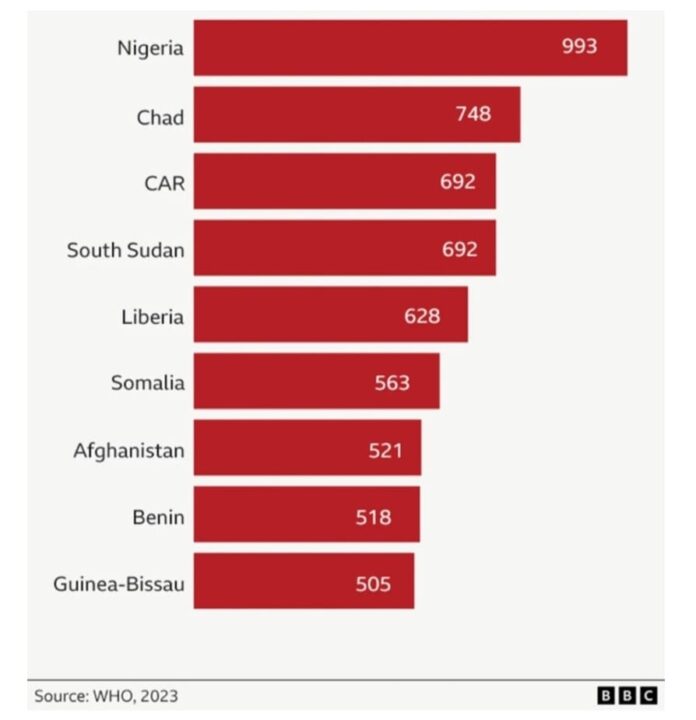From: Babagana Bukar Wakil, Maiduguri
In Nigeria, childbirth remains a dangerous journey one that too often ends in tragedy. According to 2023 United Nations data, one in every 100 Nigerian women dies during childbirth or shortly thereafter. That alarming statistic places the country among the most perilous places in the world to give birth. Nigeria alone accounted for 29 percent of all maternal deaths globally last year, with an estimated 75,000 women lost during what should have been a moment of life and celebration. That translates to the death of one Nigerian woman every seven minutes.
What makes this crisis even more devastating is the fact that many of these deaths are preventable. Common complications such as postpartum hemorrhage, obstructed labor, hypertensive disorders, and unsafe abortions conditions that are manageable with proper medical care continue to claim lives. But in a country where the healthcare system is severely underfunded and access to quality maternal care remains limited, especially in rural and underserved areas, survival is often a matter of geography and income.
“No woman deserves to die while birthing a child,” says Mabel Onwuemena, National Coordinator of the Women of Purpose Development Foundation. Yet for countless Nigerian women, especially those in remote communities, maternal death has become an all-too-common and tragic outcome.
The reasons are clear and troubling. Poor health infrastructure, a critical shortage of trained medical personnel, and the unaffordable cost of care have left many women with few safe options. Cultural mistrust of formal medical institutions and ongoing insecurity in parts of the country only increase the risks.
“Some women believe hospitals are a waste of time,” Onwuemena explains. “They rely on traditional birth attendants or home remedies. But when complications arise, that delay can be fatal.”
Even when women are willing to seek help, they are often hindered by a lack of transport, long distances to the nearest health center, and the reality of arriving at facilities that are under-equipped, understaffed, and unable to respond to emergencies.
The broader picture is equally concerning. Nigeria allocates only five percent of its national budget to health, far below the 15 percent commitment it made in the 2001 Abuja Declaration. As of 2021, the country had just 121,000 midwives serving a population of over 218 million. The World Health Organization estimates that Nigeria needs at least 700,000 more nurses and midwives to meet basic healthcare coverage standards. Currently, fewer than half of all births in Nigeria are overseen by skilled health professionals, a direct contributor to the high mortality rate and a profound systemic failure.
Still, there are signs of hope. In late 2023, the federal government launched the Maternal Mortality Reduction Innovation Initiative, known as Mamii, to target 172 high-risk local government areas across 33 states. The pilot phase is already active in six states. According to Dr. Nana Sandah-Abubakar, Director of Community Health Services at the National Primary Health Care Development Agency, the program involves house-to-house identification of pregnant women, tracking their antenatal attendance, and linking them to needed services. So far, more than 400,000 pregnant women have been identified. The initiative also includes support for local transport systems and efforts to enroll women in public health insurance schemes.
While Mamii represents a welcome step forward, public health experts warn that success depends on more than good intentions. It requires sustained investment, strong implementation, and rigorous monitoring to avoid repeating the mistakes of the past.
“Programs like Mamii are welcome,” says UNICEF’s Martin Dohlsten. “But their success hinges on funding, continuity, and follow-through. Without that, we risk making promises we can’t keep.”
The stakes are heartbreakingly high. Every maternal death is not just a statistic but a woman lost, a family broken, and a future stolen. Globally, maternal mortality has dropped by 40 percent since 2000. In Nigeria, the decline has been only 13 percent evidence of just how far the country has fallen behind.
Until Nigeria turns policy into sustained action and invests seriously in the health and dignity of its women, it will continue to carry the tragic burden of being one of the deadliest places in the world to give birth.
MNT/BBW




